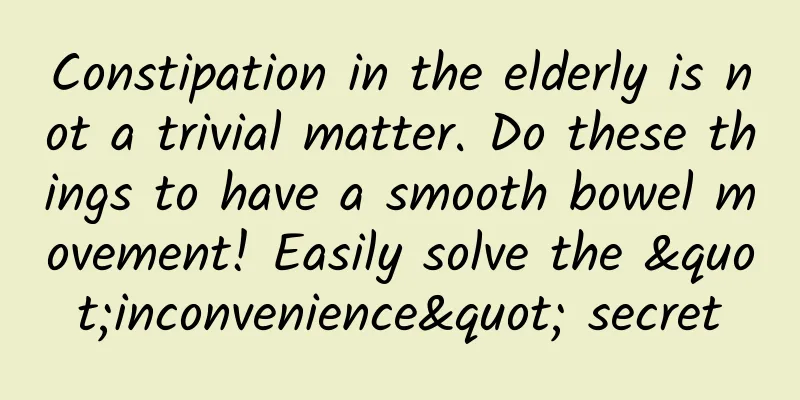Constipation in the elderly is not a trivial matter. Do these things to have a smooth bowel movement! Easily solve the "inconvenience" secret

|
Constipation is a common digestive tract symptom in clinical practice and one of the common health problems among the middle-aged and elderly. Data show that the prevalence of constipation among the elderly in my country is 15%-20%, and the incidence rate in women is higher than that in men. Chronic constipation should not be underestimated. Although it does not directly cause death, it seriously affects the quality of life and increases the mortality rate of hypertension, cardiovascular and cerebrovascular diseases. Some elderly patients have passed the most dangerous stage of acute diseases, but their original diseases relapse due to constipation. Regarding the prevention and care of constipation among middle-aged and elderly people, the Nursing Department of Hunan Guangxiu Hospital will give you the following scientific knowledge and suggestions. Knowledge point 1: What symptoms are considered constipation? The main symptoms of constipation are reduced frequency of bowel movements, reduced stool volume, dry stool, and difficulty in defecation. The old concept was that constipation was when defecation lasted more than 3 days, the stool was dry and hard, and defecation was difficult. The new view in the medical community is no longer based solely on symptoms such as long bowel movements and dry stools, but mainly on whether defecation is difficult. Knowledge point 2: The main causes of constipation in middle-aged and elderly people 1. Physiological changes: As we age, the digestive enzymes secreted by the salivary glands, gastrointestinal tract and pancreas gradually decrease, the abdominal and pelvic muscles become weak, and the intestinal peristalsis slows down. Physiological changes may cause food residues to stay in the intestines for too long, excessive water absorption, and dry stools. 2. Dietary changes: Elderly people eat less, have difficulty chewing due to missing teeth, eat too fine food, or lack sufficient fiber in their diet, resulting in relatively less food residue and less stool volume, which cannot effectively stimulate intestinal peristalsis, all of which can cause constipation. 3. Drug factors: Some middle-aged and elderly people take medications for a long time, such as sleeping pills, antihypertensive drugs, anticoagulants, painkillers, antidepressants, etc., which may also affect intestinal motility. 4. Insufficient activity: The elderly have declining physical functions, limited limb movements, and may even be bedridden. Lack of exercise also affects intestinal motility. 5. Anal diseases: The elderly may suffer from anal diseases, such as hemorrhoids, anal fissures, etc. In addition, muscle degeneration and anal sphincter inability to defecate can cause fecal impaction. Knowledge point 3: How to prevent and care? 1. Adequate dietary fiber intake The Nursing Department of Hunan Guangxiu Hospital recommends that every middle-aged and elderly person eat more foods rich in fiber and vitamin B, which can promote the secretion of digestive juice and maintain normal gastrointestinal motility. Recommended vegetables and fruits include: spinach, tomatoes, cucumbers, green peppers, bananas, grapes, oranges, kiwis, etc. It is also recommended that middle-aged and elderly people should eat more than 2 liang of whole grains every day. Buckwheat, oats, beans, etc. can be mixed with rice to cook rice or porridge, and the coarse and fine grains can be matched; or the coarse grains can be processed into granules or powder to make whole grain bread, biscuits, cakes, etc. 2. Adequate water intake The Nursing Department of Hunan Guangxiu Hospital reminds you to drink a glass of warm water on an empty stomach in the morning to help moisten the gastrointestinal tract and soften stool. 3. Exercise You can choose the exercise that suits you according to your physical condition, such as walking, Tai Chi, etc. 4. Develop the habit of defecating in the morning or after breakfast When people wake up in the morning, their colon contractions increase. After a meal, colon movements also increase. If you feel the urge to defecate, you should go to the toilet in time. Even if you don't feel the urge to defecate, you should go to the toilet regularly. Over time, you will develop a reflex defecation habit. Be careful not to suppress the urge to defecate, concentrate (do not read, look at your phone, or smoke), and choose an appropriate defecation position. 5. What should we do for the elderly who are bedridden for a long time? Family members can perform abdominal massage to promote intestinal motility. 6. What to do if fecal impaction occurs? In the early stage, suppositories can be used to lubricate the intestines and relieve constipation, such as enema, compound carrageenate suppository, etc. If necessary, retention enema or artificial defecation can be performed under the professional guidance of a doctor. Hunan Medical Chat Special Author: Xie Ya, Nursing Department, Hunan Guangxiu Hospital Follow @湖南医聊 to get more health science information! (Edited by ZS) |
<<: #千IP创科学popularization# Tuberculosis: The White Plague of the 19th Century
>>: How does dieting extend your life?
Recommend
Why is there poor intrauterine sound transmission after medical abortion?
Medical abortion is harmful to the human body and...
What anti-inflammatory drugs should I take after vaginal tightening surgery?
In order to improve the quality of their sex life...
Can farts predict cancer in the body? If you often fart these three types, don't take it lightly!
Did you know that farting is sometimes not just a...
Can I prepare for pregnancy while taking anti-inflammatory drugs during menstruation?
We all know that many women feel stomach pain and...
Headaches as a sign of successful conception
Many people experience headaches in the early sta...
How long can you not have an abortion?
Many female friends have to choose to have an abo...
What causes vulva itching?
Nowadays, many women often suffer from vulvar itc...
Will yellow leucorrhea affect women’s pregnancy?
The incidence of abnormal leucorrhea seems to be ...
Why do women wear underwear?
Why do women wear underwear? This question makes ...
How many days does ovulation usually end?
There is an ovulation period after a menstrual cy...
Who is suitable for practicing Ba Duan Jin? Why do I feel dizzy after practicing Ba Duan Jin?
Ba Duan Jin is a colorful treasure in traditional...
Endometrial growth rate
The growth rate of the endometrium is not very fa...
How to treat chronic gynecological inflammation, daily treatment methods
Gynecological inflammation is a common female dis...
What are the contagious gynecological diseases?
Gynecological diseases are nowadays an increasing...
Thyroid nodules "demon-slaying"! Nezha's three heads and six arms teach you how to slay demons and prevent nodules
Does the "thyroid nodule" on the physic...









